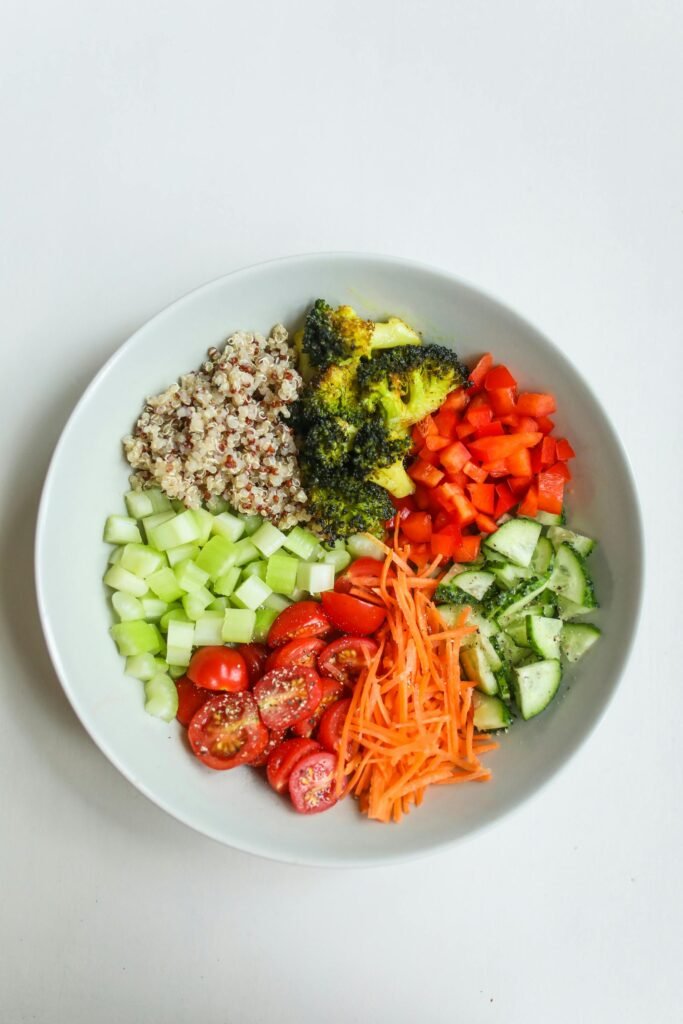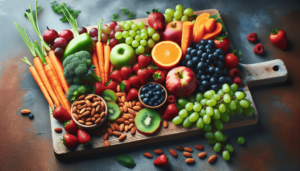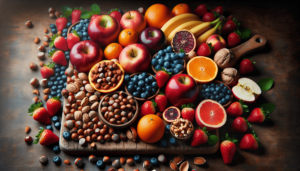Essential Tips for Following a Plant-Based Diet
Are you considering adopting a plant-based diet but don’t know where to start? Look no further! In this article, we will provide you with essential tips and tricks to help you successfully transition to a plant-based lifestyle. From incorporating more fruits and vegetables into your meals to exploring plant-based protein sources, we’ve got you covered. So, whether you’re aiming to improve your health, reduce your environmental impact, or simply try something new, follow these plant-based diet tips and embark on a delicious and nutritious journey.

This image is property of images.pexels.com.
Understanding a Plant-Based Diet
Definition of a plant-based diet
A plant-based diet is focused on consuming primarily foods that come from plants, such as fruits, vegetables, whole grains, legumes, nuts, and seeds. It emphasizes the inclusion of these foods in the diet while limiting or avoiding animal products, including meat, poultry, fish, dairy, and eggs. The goal is to prioritize the intake of nutrient-dense plant foods to promote overall health and well-being.
Difference between a plant-based diet and a vegan diet
While a plant-based diet and a vegan diet share similarities, there are some key differences between the two. A vegan diet excludes all animal products, including meat, dairy, eggs, and even honey, from one’s diet and lifestyle. On the other hand, a plant-based diet allows for some flexibility, as individuals may choose to include small amounts of animal products occasionally. The focus of a plant-based diet is on whole, plant foods, while a vegan diet is driven by ethical and moral considerations.
Health benefits of following a plant-based diet
Adopting a plant-based diet can have numerous health benefits. Research has shown that plant-based diets are associated with a reduced risk of chronic diseases such as heart disease, type 2 diabetes, obesity, and certain types of cancer. Plant-based diets are typically lower in saturated fat and cholesterol while being rich in fiber, vitamins, minerals, and antioxidants. Plant foods are also known to promote healthy digestion, support weight management, and improve overall gut health.
Getting Started with a Plant-Based Diet
Assess your current diet
Before embarking on a plant-based diet, it’s essential to assess your current dietary habits. Take note of the types of foods you typically consume and identify areas where animal products are dominant. This self-reflection will help you understand the changes you’ll need to make and serve as a starting point for planning your new plant-based eating patterns.
Gradual transition or immediate change
Decide whether you want to transition to a plant-based diet gradually or make an immediate change. Some individuals find it easier to gradually eliminate animal products from their diet, allowing their taste buds and body to adjust gradually. Others prefer to make an abrupt change, quickly adopting a full plant-based diet. Choose the approach that aligns with your personal preferences and lifestyle.
Setting realistic goals
Setting realistic goals is crucial when starting a plant-based diet. Determine what specific changes you want to make, such as reducing meat consumption or replacing dairy milk with plant-based alternatives. Start with small, achievable goals and gradually progress towards a more plant-focused diet. Celebrate each milestone along the way, as it will help to keep you motivated.
Seeking professional guidance
If you’re unsure about how to structure your plant-based diet or have specific health concerns, it may be beneficial to seek guidance from a registered dietitian or nutritionist specializing in plant-based nutrition. They can provide personalized recommendations that take into account your dietary needs and goals to ensure you’re meeting all your nutritional requirements.

This image is property of images.pexels.com.
Emphasizing Whole and Nutrient-Rich Foods
Incorporating fruits and vegetables
Fruits and vegetables should form the foundation of your plant-based diet. Aim to include a wide variety of colorful fruits and vegetables in your meals and snacks. These plant foods are high in vitamins, minerals, antioxidants, and fiber, which are essential for optimal health. Experiment with different cooking methods and try to consume them raw or lightly steamed to preserve their nutritional value.
Choosing whole grains
Whole grains are a key component of a plant-based diet as they provide essential nutrients and energy. Opt for whole grains such as brown rice, quinoa, barley, oats, and whole wheat bread instead of refined grains. Whole grains are rich in fiber and complex carbohydrates, which promote satiety and provide sustained energy throughout the day.
Opting for legumes and beans
Legumes and beans, like lentils, chickpeas, black beans, and kidney beans, are excellent sources of plant-based protein, fiber, iron, and other vital nutrients. They can be prepared in various ways, such as in soups, stews, salads, or even as the base for plant-based burger patties. Incorporating legumes and beans into your diet regularly will contribute to a well-balanced plant-based eating plan.
Including nuts and seeds
Nuts and seeds are nutrient-dense powerhouses that provide healthy fats, protein, fiber, vitamins, and minerals. They make for excellent snacks, and their versatility allows them to be added to smoothies, salads, stir-fries, or used as a topping for oatmeal or yogurt. Incorporating a variety of nuts and seeds, such as almonds, walnuts, chia seeds, and flaxseeds, will add flavor and texture to your plant-based meals.
Getting enough calcium and iron
Calcium and iron are two nutrients that can be a concern in a plant-based diet but can easily be obtained through careful food selection. Calcium-rich plant foods include leafy greens like kale and spinach, tofu, fortified plant-based milk, and calcium-set tofu. Iron sources for a plant-based diet include legumes, dark leafy greens, whole grains, and nuts. Consuming these foods regularly will help ensure adequate intake of these essential nutrients.
Ensuring Adequate Protein Intake
Understanding plant-based protein sources
Plant-based protein sources include legumes, beans, tofu, tempeh, seitan, edamame, quinoa, lentils, chickpeas, and hemp seeds. These foods are excellent sources of protein, providing all the essential amino acids required by the body. Understanding the variety of plant-based protein sources available will help you plan your meals to meet your protein needs.
Combining different plant-based protein sources
While individual plant foods may not contain all the essential amino acids in the same proportions as animal products, combining different plant-based protein sources throughout the day ensures you get a complete range of amino acids. For example, consuming beans with whole grains or pairing tofu with quinoa creates a complementary protein profile that meets your body’s protein requirements.
Monitoring protein consumption
It’s essential to monitor your protein consumption to ensure you’re meeting your individual needs. The recommended daily protein intake for adults is approximately 0.8 grams of protein per kilogram of body weight. However, individual requirements may vary based on factors such as age, activity level, and overall health. Tracking your protein intake using a food diary or mobile app can help ensure you’re consuming an adequate amount.

This image is property of images.pexels.com.
Filling Nutritional Gaps
Monitoring vitamin B12 levels
Vitamin B12 is primarily found in animal-based foods, and those following a plant-based diet may be at risk of deficiency. It’s important to monitor your vitamin B12 levels regularly and consider supplementation, as plant-based sources of vitamin B12 are limited. Speak with your healthcare provider or a registered dietitian to determine the best approach for supplementing this essential nutrient.
Considering vitamin D supplementation
Vitamin D deficiency is common, regardless of dietary pattern, but plant-based individuals may have a higher risk due to limited food sources. While vitamin D can be synthesized through exposure to sunlight, supplementation is often necessary, especially in regions with limited sunshine or during the winter months. Consult with a healthcare professional to determine if vitamin D supplementation is right for you.
Evaluating omega-3 fatty acid intake
Omega-3 fatty acids play a crucial role in cardiovascular health and brain function. While plant-based sources of omega-3s exist, such as flaxseeds, chia seeds, and walnuts, these provide a different form of omega-3s compared to fish sources. Consider incorporating an algae-based omega-3 supplement into your routine to ensure you’re meeting your omega-3 needs.
Getting enough iodine
Iodine is an essential mineral that plays a vital role in thyroid function. Plant-based diets may be lower in iodine due to the absence of iodized salt and limited consumption of seafood. Including iodine-rich foods like seaweed, nori, and iodized salt or considering an iodine supplement can help ensure adequate iodine intake.
Considering iron supplementation
Iron needs can be particularly important for individuals following a plant-based diet, as the iron from plant foods is not as easily absorbed as the iron from animal sources. Consuming iron-rich plant foods, such as lentils, spinach, and pumpkin seeds, alongside vitamin C-rich foods, can help enhance iron absorption. However, some individuals may still require an iron supplement if their iron levels are consistently low, as determined by a healthcare professional.
Reading Food Labels and Ingredient Lists
Identifying hidden animal ingredients
When following a plant-based diet, it’s crucial to read food labels and ingredient lists carefully. Animal-derived ingredients can be hidden in processed foods under different names. Watch out for ingredients like gelatin, casein, whey, and ingredients that may be derived from animals, such as certain food colorings or additives. Familiarize yourself with these terms to ensure you’re making informed food choices.
Avoiding processed and refined products
While not all processed or refined products are off-limits in a plant-based diet, it’s important to limit their consumption. Processed and refined foods are often low in nutrients and high in added sugars, unhealthy fats, and sodium. Opt for whole, unprocessed foods as much as possible to maximize the nutritional value of your meals.
Choosing organic and non-GMO options
Choosing organic and non-GMO (genetically modified organism) options aligns with the principles of a plant-based diet by prioritizing natural, minimally processed foods. Organic foods are grown without synthetic pesticides and fertilizers, while non-GMO foods are not genetically modified. These choices support the consumption of quality plant-based foods that are better for both personal health and the environment.
Recognizing plant-based protein sources
Educate yourself on various plant-based protein sources, as they may not be familiar to everyone. Familiarize yourself with foods like tofu, tempeh, seitan, plant-based protein powders, and legumes. Knowing the options available will help you create varied and satisfying plant-based meals.
Meal Planning and Preparation
Creating a balanced meal plan
Meal planning is key to maintaining a healthy and well-rounded plant-based diet. Aim to include a good balance of carbohydrates, protein, and healthy fats in each meal. Plan your meals for the week ahead, taking into consideration your personal schedule and preferences. Ensure that your meals contain a variety of fruits, vegetables, whole grains, legumes, nuts, and seeds to meet all your nutritional needs.
Batch cooking and meal prepping
Batch cooking and meal prepping can be a time-saving strategy when following a plant-based diet. Dedicate one day a week to prepare larger quantities of staple foods, such as grains, legumes, and roasted vegetables. Portion these foods into containers for easy grab-and-go meals or reheating throughout the week. Having pre-prepared meals and ingredients readily available can help you stay on track with your plant-based eating goals.
Experimenting with recipes and flavors
One of the joys of a plant-based diet is the opportunity to explore new ingredients, flavors, and recipes. Experiment with various plant-based ingredients, herbs, and spices to create exciting and flavorful dishes. Look for inspiration from cookbooks, online recipe sites, social media, or even take a cooking class to expand your culinary skills and keep your meals enjoyable and satisfying.
Packing nutritious plant-based lunches
Packing nutritious plant-based lunches is essential for those who are often on the go or work outside the home. Planning and prepping ahead will ensure you have wholesome options available when hunger strikes. Prepare balanced meals that include a variety of vegetables, whole grains, and plant-based proteins such as tofu, tempeh, or legumes. Consider using reusable containers to reduce waste and make your lunches more eco-friendly.
Eating Out and Socializing
Researching vegan-friendly restaurants
Before dining out, take the time to research and identify vegan-friendly restaurants in your area. Many restaurants now offer plant-based menu options, and some are entirely vegan or vegetarian. Browse restaurant websites or use apps that provide vegan and vegetarian restaurant listings to find places that cater to your dietary preferences.
Communicating with waitstaff and chefs
When eating out, it’s important to communicate your dietary needs to the waitstaff and chefs. Politely inquire about plant-based options or ask if they can make modifications to accommodate your needs. Most restaurants are willing to accommodate dietary preferences if given advance notice. Clear communication will ensure that your meal aligns with your plant-based requirements.
Being prepared with snacks
Carrying plant-based snacks with you can be a lifesaver when you’re away from home or in situations where plant-based options may be limited. Keep a stash of portable snacks like nuts, dried fruits, granola bars, or homemade energy balls in your bag or car. This way, you won’t be caught hungry and tempted to deviate from your plant-based goals.
Bringing a plant-based dish to gatherings
Attending social gatherings or potlucks can present challenges for someone following a plant-based diet. One solution is to bring a plant-based dish to share, ensuring that there will be at least one option that fits your dietary preferences. Get creative in the kitchen, make a plant-based dish that you love, and share it with friends and family. It’s a great opportunity to showcase the deliciousness of plant-based foods and inspire others to give them a try.
Managing Nutritional Needs in Specific Situations
Plant-based diets during pregnancy and lactation
Pregnant and lactating individuals can successfully follow a plant-based diet while meeting their nutritional needs. However, it’s important to pay attention to specific nutrients like iron, calcium, vitamin B12, omega-3 fatty acids, and iodine, which are crucial during these life stages. Working closely with a healthcare provider or a registered dietitian experienced in plant-based nutrition can help ensure adequate nutrient intake for both the individual and the baby.
Plant-based diets for children and adolescents
Plant-based diets can be healthy and safe for children and adolescents when well-planned and nutritionally adequate. However, it’s essential to ensure they receive all the necessary nutrients for growth and development, such as protein, iron, zinc, calcium, and vitamin B12. Consulting with a pediatrician or a registered dietitian who specializes in pediatric plant-based nutrition can provide guidance on meeting nutritional needs at different ages.
Plant-based diets for athletes
Athletes following a plant-based diet can meet their nutritional needs to support their performance and recovery. It’s crucial to ensure an adequate intake of carbohydrates for energy, plant-based protein for muscle repair and development, and key nutrients like iron and calcium. Working with a sports dietitian who has experience in plant-based nutrition can help tailor a personalized diet plan to optimize athletic performance.
Plant-based diets for older adults
Plant-based diets can be beneficial for older adults, providing a wide range of nutrients and promoting overall health. Adequate intake of calcium, vitamin D, vitamin B12, and omega-3 fatty acids should be emphasized to support bone health, brain function, and heart health. Older adults may have specific dietary needs, so consulting with a healthcare professional or a registered dietitian can help ensure any age-related nutritional requirements are met.
Staying Motivated and Overcoming Challenges
Finding support and like-minded communities
Finding support and connecting with like-minded individuals can be instrumental in staying motivated on a plant-based diet. Seek out local or online plant-based communities, participate in cooking classes or workshops, or join social media groups dedicated to plant-based living. Engaging with others who share your values and goals can provide encouragement, recipe ideas, and helpful tips to keep you motivated and inspired.
Focusing on the reasons for choosing a plant-based diet
Remembering and reaffirming the reasons why you chose to follow a plant-based diet can help you stay committed and motivated. Whether it’s for health, environmental, or ethical reasons, regularly reflect on your personal goals and values. Remind yourself of the positive impact your dietary choices have on your health, the planet, and animal welfare, which can help keep you motivated during challenging times.
Learning from setbacks and adapting
Don’t be discouraged by setbacks or moments of slipping into old habits. It’s normal to face challenges when transitioning to a new way of eating. Instead of dwelling on setbacks, view them as opportunities for growth and learning. Reflect on what led to the setback and identify strategies to prevent it from happening again. Adapt your approach and focus on making progress rather than striving for perfection.
Celebrating small victories
Celebrate and acknowledge your small victories along your plant-based journey. Whether it’s successfully trying a new plant-based recipe, reaching a personal health goal, or influencing someone’s decision to incorporate more plant-based foods into their diet, every accomplishment is worth recognizing. Celebrating these milestones will help reinforce your commitment to a plant-based lifestyle and motivate you to continue making positive changes.
Understanding and following a plant-based diet can be a transformative journey for both your health and the planet. By embracing whole and nutrient-rich foods, being mindful of your protein intake, filling nutritional gaps, and adopting practical strategies for meal planning and social situations, you can thrive on a plant-based diet. Stay motivated, seek guidance when needed, and enjoy the benefits of a diet that nourishes your body and supports your values.



